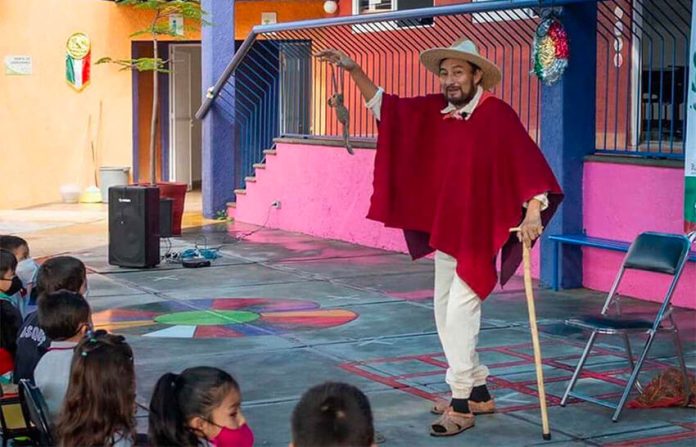An acclaimed spoken word artist who condemned the federal government for failing to pay him for his participation in a Culture Ministry program died in Colima on Wednesday.
Víctor Chi, considered one of the greatest ever narrators of the history and culture of Colima, passed away in an IMSS hospital of an unspecified illness.
The artist, also known as Pitor Chi, said in a December 27 Facebook post that he was ending the year “almost blind, almost deaf and almost unable to walk.”
In the same post he criticized President López Obrador and Culture Minister Alejandra Frausto for the government’s failure to compensate him for his participation in the 2021 edition of a program called Alas y Raíces (Wings and Roots), which provides cultural education and entertainment for children and adolescents.
Chi was selected to participate in the program last March and presented his show “Legends and Mysteries of the People of Colima” around the country.

The storyteller, who was originally from Yucatán but spent decades living in Colima, also criticized the government in a December 30 Facebook post.
Not without irony, Chi wrote: “Thanks to the blessed and great progressive transformation of this country a lot of artists, cultural promoters, managers and creators are ending the year and starting 2022 … mired in anxiety, uncertainty, debt and misery.”
“Thank you to the cultural authorities of this country, thank you to local authorities, thank you for failing to pay, for the lack of punctuality, for the discrimination and non-existent support, thank you Frausto, thank you Obrador, … thank you for destroying our mental and physical health. Hopefully you’re having a very nice time. … Meanwhile, we’ll resist until the last breath.”
Chi, who was also an activist, reading advocate and defender of native corn, included a photo of himself in his hospital bed in the post.
In another Facebook post earlier in December, he said that nobody had provided an explanation as to why he and other participants in the Culture Ministry program hadn’t been paid nine months after they were selected to contribute to it. No one in the government has the “balls to tell us we won’t be paid,” Chi added.
“It’s a sad thing, it’s the worst six-year period of government for the arts, artists and culture in Mexico,” he wrote. “… We’re not begging, we’re demanding what we’re owed due to our own efforts and dignified work.”
Members of Mexico’s creative and cultural community lamented Chi’s death and expressed their condemnation of the government’s failure to pay him. They also criticized the Alas y Raíces program for publishing a statement mourning his passing.
“… When will they understand … that … #WeDon’tLiveOnApplause,” Claudia Zarate, another spoken word artist, wrote on social media.
“Nine months without a salary! Nine months with the anxiety of not knowing what he will take to the [dining room] table to feed his family, and not because he hasn’t worked. On the contrary, he was a tireless and committed promoter of culture. … There are no words that can transmit the pain of a loss like this thanks to bureaucracy and negligence,” said Elena Ortiz, a writer.
The newspaper Reforma said that Chi’s case is “emblematic of a situation of generalized job insecurity faced by cultural [sector] workers” that has long plagued Mexico and has not improved since the current government took office in 2018.
Such workers have banded together in collectives to protest lack of payment by organizations such as the National Institute of Fine Arts and the National Institute of Anthropology and History.
Some 4,000 people who participated in the Alas y Raíces program in 2019 also faced difficulties getting the money the Culture Ministry had agreed to pay them. The government, however, hasn’t taken steps to eliminate such problems, Reforma reported.
“I never thought we [artists] could be worse off,” Chi said in one Facebook post published late last month. “But … we are.”
With reports from El Universal and Reforma
